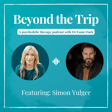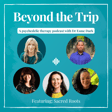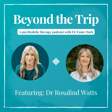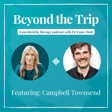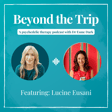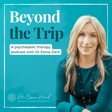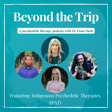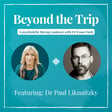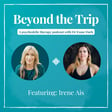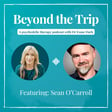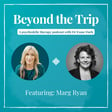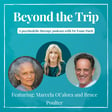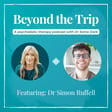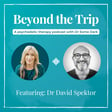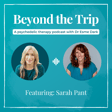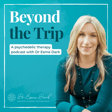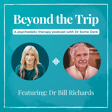Introduction to 'Beyond the Trip' and Guest Natalie Ginsberg
00:00:04
Speaker
Hello and welcome to Beyond the Trip, a psychedelic therapy podcast with me, Dr. Esme Ta. During this podcast, I'll be bringing you conversations with thought leaders and other inspiring humans, exploring a wide variety of themes relating to the use of psychedelic-assisted psychotherapy in the healing of human distress.
00:00:26
Speaker
Whether you're an aspiring therapist, already a therapist, or just simply interested in the emerging field of psychedelic therapy, then this podcast is for you. Join me for a journey into the psychedelic world. Before we get started, I want to take a moment to acknowledge the traditional custodians of the unceded land on which this podcast is recorded. The Wadda Wurrung people. I pay my respects to elders past, present and emerging.
00:00:54
Speaker
and I extend that respect to any Aboriginal or Torres Strait Islander peoples listening today.
Psychedelic Therapy and Drug Policy Reform
00:01:03
Speaker
Hi, everybody. Welcome to be Beyond the Trip. In this episode, I'm going to be zooming out a little bit from thinking about psychedelics from an individual therapeutic perspective and taking a more systemic lens. As a part of this, I'm going to be joined by Natalie Ginsberg,
00:01:24
Speaker
who has worked at MAPS since 2014. Natalie founded the Policy and Advocacy Department, where she served as its director for five years. She also initiated and co-developed the MAPS Health Equity Program. As Global Impact Officer, Natalie works for the responsible integration of psychedelics into mainstream culture to help set the setting for an ethical global movement. Before she joined MAPS, she worked as a policy fellow at the Drugs Policy Alliance,
00:01:53
Speaker
where she helped legalise medical cannabis in her home state of New York and works to end New York's race based marijuana arrests. Natalie currently lives in lot and Los Angeles. She received her BA in history from Yale College and her Masters of Social Work from Columbia University. Natalie is also the co-founder of the Jewish Psychedelic Summit.
00:02:16
Speaker
We cover a lot of ground in this conversation about things that we're both really passionate about. We talk about the beginnings of her work in the social justice space, her work in drug policy reform and her role as global impact officer at MAPS. We talk about the promise and the complexity of psychedelics in the conflict resolution space.
Psychedelics in Conflict Resolution and Training
00:02:37
Speaker
and her research in this area, we talk about the importance of psychedelics for collective as well as individual healing. And we also dive into how important it is to find ways to hold and process both our grief and our joy, love and playfulness. I hope you enjoy this conversation as much as I did.
00:03:01
Speaker
It feels like a really important thing to be talking about in the world right now. And it's been it was so wonderful to spend some time diving into these issues with Natalie. Hi, Natalie. Welcome to the podcast. Thank you. So great to be here. Thanks for having me on. Oh, that's all right. It's just so lovely to have you here. And it feels like a really lovely day to be doing this and having this conversation. you know i tomorrow I'm heading off or for a week-long residential with MAPS. So the MDMA-assisted psychotherapy for PTSD training with your colleagues, Bruce and Marcela, holding the space. And I'm going to be helping out, um running a small group as ah as a teaching assistant on that. So it feels really, it's really special to be here doing this today.
00:03:54
Speaker
Amazing. Lucky you. I just trainings are so special. I've been lucky to attend many over my decade at MAPS and I actually developed some trainings like our training for our first training for therapists of color and it's just the most extraordinary kind of container vortex experience and you just develop such special relationships. And I know we were trying actually for two colleagues from Ramallah to psychiatrists from Palestine to make it to this training in Australia and we were so disappointed the visa didn't work out in times. Yes, I'm sorry on behalf of the Australian visa system. It's very complicated. It takes a long time. but Yeah, we're really disappointed too. We were really hoping they'd be able to make it. And yeah, I mean,
00:04:48
Speaker
and last year I did the training myself as a participant. So I feel like I have a sense of that immersive, intensive nature that it's kind of like going into like, I really agree like a vortex and kind of with this, I think 55 trainees coming and and all of the staff from Monash University as
Global Training Challenges and Somatic Therapy
00:05:07
Speaker
well. And It's going to be big. Yeah. It's pretty exciting to do it in Australia where you have actually the more legal ability to be doing it outside of research. It's really extraordinary. you know I haven't been to training yet in a country where that was a possibility. like The one ah training I just attended most recently was in Bosnia, actually. Yeah. And it was a pretty extraordinary training, but there definitely isn't.
00:05:35
Speaker
legal access or even research yet, but we actually had 10 Bosnian folks, four Ukrainian folks, and there are actually 20 Arab therapists from around the Arab world, including 10 Palestinian therapists. So it was a really special mix of communities.
00:05:54
Speaker
The Bosnia training was so powerful with people from all around the world, so there was a lot of pain and frustration about you know this ongoing trauma that's happening. It's not post pt PTSD, it's trauma. and At the end, as you'll, you know, I know you've experienced at the MAPS trainings the last night, it's really important for us. There's a lot of like sitting and watching heavy videos. Really important we have this beautiful dance party to kind of move the energy and connect and get out of our mind and feel into our bodies. And it's really um always one of the highlights of the experience for me at least. And on our last night in Bosnia, there was or the morning of the, you know, before the dance party.
00:06:39
Speaker
There started being some folks like there is a Palestinian American who was like, this does not feel right. I cannot party, you know that we're in the midst of slaughter in Gaza. I do not feel okay dancing or partying and we're like, you know completely understand that and What we ended up doing, led by the incredible Bruce and Marcella, was holding this really beautiful sharing grief circle. We were all in this big room and we were invited to pick up a rock and all take turns on the microphone, kind of just sharing grief of really difficult things that were going on. Many were connected to world conflicts, but not all.
00:07:24
Speaker
things and we spent like, I think two hours and everyone was crying and sharing. It was really powerful and heavy, but powerful experience and kind of ended with these rocks in the middle of the room in a circle. But we ended up being able to doing as some, you know, Marcella is an artist, she's an art teacher and she kind of made them into this like heart kind of shape and put these candles around these rocks in the center.
00:07:53
Speaker
And then we did start to put on some music and and it turned into a really beautiful, gorgeous, powerful dance party. But we were literally dancing around these stones. They were in the absolute center of our dance floor. So it was like, we are not running away from what's going on. We're not escaping our grief. We are like dancing with our grief, holding it together.
00:08:19
Speaker
And literally, like, you know, at one point I was i walked in and a Palestinian attendee from the West Bank was doing Daabkeh, this traditional Palestinian dance with Berzel and Bruce. And it was just like turned into this joyful celebration. But it didn't mean we were ignoring anything of what was happening. And it felt like such an important kind of part of this healing work was that we have to hold space for the pain and then we also also have to make space for the joy and the healing and but we can't do that if we can't really be with the pain and acknowledge that and so that just honestly was such a profound moment for me from that training and just feeling called to share that based on our conversations with grief and all of that.
00:09:09
Speaker
so important isn't it that kind of is that idea and that that the representation of having things that represented the grief and the pain, and they'd be able to dance as well.
Joy, Love, and Inner Healing Work
00:09:22
Speaker
It's like both, and i yes, i I'm feeling a lot of grief, and like I would like to feel into some joy maybe, or some somatic processing of that, which then can become joy. And I think, you know,
00:09:40
Speaker
I think it's so important for where we find ourselves in the world right now is how do we how do we hold both those things and honor both? Totally. And if we can't access our joy and our love, then we can't vision a new way forward in a world built on love and joy.
00:09:57
Speaker
If we're only in our anger and and fear place, then that's the world we're going to recreate. So for me, it's absolutely imperative that we find places for joy and love. It's not frivolous, but it's literally absolutely imperative and necessary if we actually want to change the kind of systems that we're creating. So ah that's my prayer.
00:10:20
Speaker
Yes, am I am so with you on that. That's one of the reasons I started the Embodying Playfulness Group was that so much of the somatic psychotherapy that I trained in was focused on kind of processing trauma in the body, which is really, really important. And also we can use those processes to process joy and to really soak up all of the resources of play and joy and that we kind of need to try to do both. Amen.
00:10:49
Speaker
Yeah. Awesome. Your group sounds amazing. and Thank you. Yeah, I'm going to run another one. Hopefully next year, actually. I'm really excited too. And I'd love to hear more about that training and kind of the importance of that work feels really something that'd be really good to discuss and why that's so important and helpful at this particular time in history. You know,
00:11:11
Speaker
You and I actually, ah I mean, I met you. I don't know if you met me because there was a lot of people there, but we shared space at a workshop ran by Asa and Roz Watts called Love and Grief in the Shadow of War. And I was so moved by actually the whole experience and spent a lot of time kind of really in my grief and really allowing myself to to cry, which was really beautiful. And your talk was really,
00:11:39
Speaker
really touched me and so I thought I need to have this woman on the podcast ah in the early stages and and I'm really just starting out with this project so thank you so much for joining me. Thank you so much for saying
Social Justice and Psychedelic Therapy Intersection
00:11:51
Speaker
that. Yeah. Roz Watts is really an incredible friend and teacher. And it was such an honor when she invited me to that. And I have to say, I know over my decade of maps have gone on so many panels, did so many talks. And that was like the hardest talk for me to prepare for. I actually almost tried to back out of it before it was like, and so thank you for seeing me and feeling that, but yeah, it was,
00:12:18
Speaker
for i guess for listeners to understand. It was called, Love and Grief in the Shadow of War. It was me and Gabor Mate. and I invited two Palestinian activists and therapists, friends of mine, both also psychedelically inclined, one is a psychedelic therapist.
00:12:38
Speaker
And it was just really hard to put foot words to that. And I kind of was feeling like, who am I to to speak about what this what you know the shadow? For me, my shadow of war living safely in l LA, though I am a Jewish person and very impacted by what's going on. It's completely different, of course, than my dear Palestinian friends. And Gabor Mate, who's someone I so deeply respect and how he thinks about trauma. And he's taught me so much. And also the way that he speaks actually about this conflict can be quite difficult for a lot of Jewish people, including myself sometimes. So that was yeah yeah of another interesting dynamic right out of hold.
00:13:24
Speaker
Trauma and see how that comes up in yourself and yeah, you know my one of my Palestinian friends on that panel with me so the cut team who's a co-founder of combatants for peace he speaks all the time about the idea of collective liberation and no one is free and healed unless anyone, can everyone is and yeah perpetrator victim. Everyone has different roles, but we really need this deep healing for everyone. And he he really feels that and works for that. And so I think that was what was a bit also challenging for me that as much respect as I have for a Gabor, he tends to be focused understandably on the
00:14:05
Speaker
horrific experience of Palestinians right now and was not really always able to hold space for the grief of of Israelis or Jewish people. Yeah. And that was what struck me about listening to you and and some of the other presenters well was that actually I totally understand that it's been really hard to prepare for because it's so complex and we're trying to put words to things that actually is so horrific that words are really quite inadequate and in many ways. But that also that the the way that you were able to kind of hold both the the the horror of what was happening in Palestine and and in Gaza and the Jewish grief and kind of the complexities of doing that. And I think you did that really beautifully. and and And I just really needed a space just to go as a participant, as a therapist working in this time and
00:14:59
Speaker
just to kind of be and to be with my own emotions instead of kind of being out and holding other people with theirs. And so it was really, really special and important on a personal level for me to have that time to do that. Thank you so much for sharing that and excited to share that with Roz too. She's such a special soul to have that vision and create that space the way she did. Yeah. And there's lots of themes around that that we'll kind of get more into today, but before we kind of do, I guess maybe we'll start at the beginning with you. So maybe you can tell us a little bit about your history, your background in this work, how you began with maps and what drew you to the kind of social justice space that you find yourself in now.
Natalie's Journey in Drug Policy and Plant Medicine
00:15:43
Speaker
Just taking a pause because of course there's so much to that answer. Yeah, take it wherever you want.
00:15:51
Speaker
I mean, I guess just based on what we were saying earlier, and I'm called to to start with an early touch point when you ask about why I'm drawn to social justice. I do believe it's my experience as a Jewish person that has really always drawn me to justice work when I was young, like my favorite book when I was like seven or eight was called When Hitler Stole Pink Rabbit, which is like, you know, pretty sad in a lot of ways that that's how like young Jewish kids sometimes grow up reading all about, you you know, um the horrific things, but I'm grateful that what it allowed me to
00:16:31
Speaker
See and was that like, you know how messed up societies can be and I was living in New York City in, you know, the 90s I was born in 89 so I would say it's probably one of if not the safest times for Jews in like history and reading about that I just you know, I felt quite safe but I was like, well who Looking around my country who is not safe like there are other people here who are having the horrible experiences that i'm reading about maybe not concentration gas but. ah Prison system is can of be you know i don't need to like compare it but it's a pretty horrific thing as well and so that kind of.
00:17:10
Speaker
always opened me up to this work around also racial justice and seeing that people could be discriminated against based on their ethnicity and identity. And yeah and that really drew me to working around in systems of mass incarceration. tu In college, I like tutored in a maximum security security prison and was drawn to just understanding how to make changes in that system. And I thought that I actually would be a public defender. And one summer I interned for the Brooklyn DA's office, which was, I thought it was helpful to like see the other side before I was a defender. And I was so frustrated doing that job because I was getting arrest after arrest of like 13 year old black boys arrested for like specs of marijuana. You know, and at the time I was,
00:18:02
Speaker
in college at Yale, you know smoking weed myself with my friend whose mother was like a judge at that court and we had not a problem in the world. And even if a cop had approached us, it you know wouldn't have been a big deal. And understanding that these kids' lives were being ruined by these marijuana arrests. So that was really eye-opening. And really kind of got me looking a little bit more towards drug policy reform as this site of like perpetuation of injustice, especially in a racially discriminate manner. And I got drawn into social work because I was like, I kind of want to, the system is so black and white. Like we were speaking a bit about this black and whiteness and I was drawn to making change in the system, but not necessarily having to conform to the black and white energy. Yeah. And then
00:18:56
Speaker
I got to social work school and I was working as a therapist for people arrested for prostitution at a court. It was like an alternative sentencing court. And then I was working in the South Bronx as a guidance counselor at a middle school. And both of those contexts kind of reinforced that even the individual so-called issues really often were connected to such systemic issues like racism or policing. or you know i My like middle school kids would be treated like criminals by police just walking to school doing nothing. So that really also kind of led me back into this interest of ah policy reform as a way of
00:19:43
Speaker
helping kind of stem some of the tides of trauma that this I was seeing. And so then I ended up working at the Drug Policy Alliance, which was doing incredible work on drug reform. It does domestically in the US. It does global work. And it actually was when I joined was just launching this campaign around marijuana arrests. And now it's kind of common knowledge relatively that marijuana arrests are very racially biased.
00:20:12
Speaker
But that was actually a lot of their work. They commissioned the studies. They did media campaigns to raise awareness. So I was really lucky I got to work with them on that. And then they moved me to the medical mar marijuana campaign, which I was like,
00:20:28
Speaker
Okay, cool. I didn't really understand actually the power of the medicine and that got me into plant medicine.
Root Causes of Trauma and Systemic Change
00:20:35
Speaker
Long story short, I started looking into some psychedelic stuff and I was like, what is this that like is actually addressing the root source instead of just the symptoms? like How can he have three sessions of psychedelics help someone with addiction or PTSD, which are things in social work school, I was being taught there's no way to heal from you can just reduce the symptoms and manage them. So ultimately, I was really drawn to this psychedelic work because I saw that it was helping people address the root source of things and actually healing. And when they looked at the root source, it was often like systemic injustice. So I saw it also as a means of helping motivate people to make change
00:21:16
Speaker
in their their community on top of the individual healing. so That's that's the the bit of the spiel. i love Thank you. yeah it is so many There's so much richness in what you just shared. and there' it's it's I'm sure that's like one part of a really long story too. right but i think you know if i think about you know When I was thinking about this podcast, you know Beyond the Trip, it's like a therapy podcast and the focus is like,
00:21:43
Speaker
You know, my initial idea was to think, talk about the psychotherapy part of psychedelic assisted psychotherapy as we are here in Australia, very fortunately moving into clinical use. But as a human and as a therapist and the way I was trained, which in Australia feels like I kind of, I'm i'm a psychologist by background on clinical psych trained in the UK originally.
Dr. Ta's Background and Work with Refugees
00:22:07
Speaker
And in in Australia, I often end up working in places with a lot of social workers.
00:22:13
Speaker
because how I think and how I was trained to think is much more kind of wide lens, thinking about social inequalities and the impact of kind of systemic, how imbalances and the trauma that that creates that then causes suffering and distress. And so that training led me into a human rights organization called Foundation House, which is a service over here that works with survivors from conflict, so torture and trauma counseling service.
00:22:42
Speaker
for refugee and migrant and asylum-seeking populations in Australia. And so but my journey into psychedelics kind of came through that in an interesting way. it's it's So I was doing that work and and then kind of very steeped in not working with a lot of PTSD. And then I actually heard about MAPS and heard about the work that you were doing with MDMA-assisted ps psychotherapy and thought, well, I really need to understand this. And like you was kind of drawn into that idea of looking at what's the root cause?
00:23:11
Speaker
you know like what's actually underneath this and that yet and then how do we also because our individual healing is just one but it's very important but it's also how do we take that out into the world and this is the integration piece and then how do we take that into the world to be the best kind of humans that we can and to start to change some of these systems and that's why it's so inspiring to hear you talk about that kind of policy reform which is such an important piece of this work yeah so thank you Thank you for sharing that. I didn't know that part of your trajectory. It's beautiful to hear. Yeah. Yeah, it's been an interesting space. And you spoke a little bit about some of the things that you do in your role as global impact officer in that maps of memory. I know you've had probably, you've been there 10 years, is that right? Yeah, so a few different roles. So do you want to share a little bit about the focus of that and what you do as part of that role and why it's important?
00:24:10
Speaker
Sure. Yeah, I'd say the majority of my time at MAPS, are like I founded the policy team and served as a policy director. But then I found that I was doing things that were kind of peripherally policy related, like developing this training for therapists of color, or doing a lot of global work that was a combination of community building and policy change. And I actually started finding I'd be in DC lobbying and I'd have legislators literally reference like a law and order TV episode about MDMA instead of the research and I was so frustrated and then I realized like, okay, I can be frustrated or I can live in LA and actually work with people who are telling these stories and help them tell more accurate stories. So that was a big motivation for me to kind of
00:25:04
Speaker
shift into this global impact conception of like how are we helping our society make space for and responsibly integrate psychedelics in a way that's safe and that makes sense and that is equitable. like That's another big piece. there's so much we see around so-called psychedelic exceptionalism which is this idea that psychedelics are like the good drugs and other drugs are the bad drugs and because of course that means psychedelic users are the good people and people using other drugs are the bad people and also gives false notions of safety with psychedelics and you know any any substance can be dangerous or safe depending
00:25:47
Speaker
on how we consume them. So I think that's a really important piece. But yeah, with global impact work, I've really appreciated that I've kind of been able to to do many different pieces of work. I'm like, currently, you know, I've ah developed in that time, a study, well, actually, maybe it started as when I was policy director, but a study with a colleague with two colleagues, Dr. Lior Roseman and Antoine Saka, interviewing Palestinians and Israelis who drink ayahuasca together. And right now, I'm developing another study interviewing with Colombia. Dr. Jay Sevelius is the PI and working with
00:26:30
Speaker
colleagues, Bea Vache and McKenna Layden. And the study is interviewing MDMA, like underground couples therapists, because we're seeing that it's such a common use. And before MDMA was criminalized, it was used quite like that was one of the main use cases for MDMA. but we have very, very limited research and understanding on what's going on with that. So very interested in talking about getting to the root. I'm like, we can heal the parents. There's a lot, a lot of healing that can emerge from there. Yeah. Yeah. and Maybe I'll leave it at that, but I'll say it's just a kind of general global impact. My, my work with that is also just kind of on narrative building, storytelling, and yeah how we're, how MAPS is approaching that both in the US and around the world.
00:27:19
Speaker
Yeah, that's really awesome. there's I'd love to ask you a bit more about those two research projects that also, you know, I think that in Australia, you know, I think there's something, one of my reasons for starting the podcast, there's a few, but one of them was that, you know, it's been an interesting journey in the psychedelic field in Australia.
MDMA and Its Therapeutic Potential
00:27:38
Speaker
There's been people who've been interested in this work here for but quite a long time, and there's been research slowly building. And then all of a sudden, quite quickly, really, in in terms of the majority of the movement here, I guess, we were so it was rescheduled. in in And so there's that happened, I think, faster than I sort of would and faster than my colleagues sort of would, and has left a bit of a gulf. There's still a lot of misunderstandings in the community.
00:28:07
Speaker
about what we're doing, about what psychedelic-assisted therapy is. and so I think it's really important to talk about like the different layers, you know because there's the way it's been rescheduled here is psychedelic-assisted therapy tied into for people with treatment-resistant depression, with psilocybin-assisted therapy, as you know, I'm sure, and then MDMA-assisted therapy for PTSD.
00:28:29
Speaker
And that work is really important, but of course it's just one part of how psychedelics can be really helpful. And, you know, the couples counseling, you you know, is such an important thing. And I actually don't know if it's a super common knowledge here in Australia that MDMA's first use was that, that it was actually being used a lot like that before it was made illegal. And that, you know, you were just hinting here that like working with parents to enable them to to reduce the conflict, to enable them to come together, to be more aligned, communicate better, is going to be so, so helpful for the children, right? Because when
00:29:10
Speaker
When that's when the parents are working well, that the attachment with the child is gonna be stronger and more secure, and that has all kinds of implications for how they are in the world. Totally, and I actually have a ah dream to try to develop, how or to see how MDMA could be supportive for also divorce mediation. yeah Also for the children you know the children's sake, but for, you know, it's like both either coming together or separating, but with love and respect and understanding,
00:29:38
Speaker
And yeah there's of course, there's so much pain usually. And so kind of being able to ah heal or hold space for that ah pain. But yeah. Yeah. I think that would be a really awesome piece of research. And I know there's some people here in Australia who are also thinking about research into couples therapy with MGMA and trying to look for funding for that. and You should connect them with me. I'd love to talk to them about it. Yes. I'm sure Rick would too.
00:30:06
Speaker
ah Yes, I think I have a feeling they may already be connected if they're not, I will definitely. Yeah, because I think it's really, it's really important. And there's, you know, if you think about, you know, how we are as humans and how we heal, there's us as an individual and our one on one therapeutic work or the work we might do with ourselves.
00:30:24
Speaker
either you know in therapy or psychedelics or just healing ourselves in and meditation or yoga, however people want to do that. And then there's the family system, isn't there? And then there's the sort of wider social cultural systems around people.
Ayahuasca Ceremonies and Cultural Healing
00:30:39
Speaker
And it sounds like something that was really, that sounds like something that was really important in the work that you did with the ayahuasca research. Do you want to speak a little bit to that and how that even idea came about and tell us a little bit about that research?
00:30:54
Speaker
Sure. I think different versions of that idea have kind of oh been like in the ether, you know, people would kind of make jokes about it. You just put and you made the water supply in Israel and see what happens. yeah But I, for me, it was actually like when around when Trump was elected that like Okay, we need to time 2016 back way back when the first time around that yeah that we really thought it was time. I was also really interested in doing that work with Republicans and Democrats and using MDMA to see how that would be helpful.
00:31:33
Speaker
but ah leor roseman was a friend and colleague and we had actually traveled around Israel with Rick and Stan Groff and this really special group and we kind of talked a lot on that trip. It was like in early 2015 about what what using these substances for peace building and conflict resolution transformation restorative justice, what these things could look like. So to set out, for me, it was really important that before we just tried to try something, I wanted to understand what was already happening, which, you know, honor definitely is where I'm learning
00:32:15
Speaker
a more feminine or you know not that feminine is always identified with the gender but like the more you know the yin to the yang the energy of like let's like see what's here before we charge forward yeah so I tend to really love these kind of qualitative observation studies understanding where we're at before we do interventional work and so where we were at where was that in the land. There were ayahuasca ceremonies that had both Israeli and Palestinian participants and so we wanted to interview those participants to understand what was happening in their experience. An important thing to understand was that these were not ceremonies with the explicit intention of peace building or conflict resolution
00:33:05
Speaker
They were ayahuasca ceremonies people go to for healing or for you know spiritual connection. And for something that was interesting is that for Israelis, there are many, many places that they could find this. So for them to go to a ceremony that had Palestinians present was kind of a self-selecting group in general, people that were really excited to be in a joint space.
00:33:32
Speaker
And for Palestinian attendees, and this was you know many years ago, there were very few options so that they wanted to sit with ayahuasca that they were likely going to have to sit with Israelis. So even that was an interesting starting point where yeah people were coming from different place in that way. And most of the ceremonies were still like majority Jewish Israeli. But there were a lot of powerful pieces like music that would be both in Arabic and Hebrew. And there were there were efforts in these ceremonies to create this space that had space for it for everyone.
00:34:11
Speaker
And yeah, and some really beautiful things emerged from those interviews and that led my colleague, Lior, to work with a new colleague, Sami Awad, to develop a more interventional study where they actually brought people, activists, artists, friends of ours to to Spain to sit with Ayahuasca with the intention of peace building. So that was also really interesting. Yeah. Yeah.
00:34:40
Speaker
And it feels like, yeah, I've read i've read the i've read the paper that that you put out about this. and And I was really struck by a lot of things in there. And I think one of those was the power of the music you know and listening to a song from each other's culture and kind of and kind of that can be a really healing thing in itself. and And I also really appreciated how in that article you all kind of spoke to ah complexities and when you're doing qualitative research there's always going to be kind of challenges like this and that kind of power imbalance that you spoke about that is kind of unavoidable around having you know majority Israelis and then Palestinians are always going to be a self-selecting sample but it's still so important. it's how
00:35:28
Speaker
I so agree with you. I'm a, i my PhD was all qualitative research. It's just how my brain works. I'm much better in that. I think it's a therapist thing as well. You know, I'm much better in that space. I think it's a really important part of to the picture to kind of understand this. and i And I also really liked how in the article there was kind of he was speaking or the writers or the viewer speaking about the importance of doing the inner healing work for each other and kind of, but also the collective healing and being with and processing collective trauma and that kind of bringing those, and ayahuasca circles are naturally kind of happening in a collective ritual based community kind of space, but sometimes in in the kind of more new age side of things that can be very individualistic, can't sit like focused on on people working with themselves, but the importance of trying to find a way to to work as a collective as well, as I mentioned, which I really liked.
00:36:26
Speaker
And we we found that even if that wasn't the stated intention just by virtue of the context, the set and setting, yeah people did have more of that collective experience than maybe another Ayahuasca ceremonies. And there were often stories of people, you know, Israeli people having an experience of being a Palestinian person and also vice versa, a Palestinian friend experience being behind the gun of an Israeli soldier in ceremony, like crazy, powerful yeah things, understanding the so-called other and healing this more broad, collective, shared trauma. And it was quite profound. And yeah, the intergenerational trauma piece is like so deep. And yeah to be able to like touch that together in ceremony,
00:37:12
Speaker
was really important but I'd also say like what we believe, what I believe is that it's also really important that people have this opportunity to do their own work individually and then also maybe in their community like for you know a Jewish person to be around other Jewish people to heal some of their intergenerational trauma before being in a shared space with Palestinians and then healing that collective trauma and um so I think that was another item of like how when to when it makes sense to like come together in that healing and when maybe sometimes it's appropriate to like give yourself a different kind of container to drop into that. and you know You mentioned that the music piece and it was such a so many people really spoke to the music playing such an important role and
00:38:01
Speaker
As you said, especially hearing songs in a late, you know, Israelis are trained to be so terrified of Arabic. So there is all these stories of Israelis hearing Arabic and realizing how beautiful it was and feeling like so open and how one is really starting learning Arabic after, you know. But something I'm called to share is that in most ayahuasca spaces,
00:38:23
Speaker
People are not singing in their language, you know, they're maybe singing from a different culture that stewarded ayahuasca or in Spanish and which also, you know, I really honor keeping medicines in their context. But I think there's also something really important about creating spaces for people to have access to their own ancestral music and traditions when they're in that deep medicine space. And I know personally that's been very profound. I co-founded the Jewish Psychedelic Summit a few years ago because I really wanted people to have access like I did to two spaces that I felt, you know, my ancestors present and the energetics of the song. It just, you know, had a different experience for
Jewish Psychedelic Summit and Ancestral Connections
00:39:10
Speaker
and you know, and luckily in Judaism, there actually are a lot different plant medicines in our history, including medicines that when you mix together have the same reactions as ayahuasca. So I'm a big believer in like, inviting people it's the best that they can to trace their lineage, if that's available to them and kind of understand what plants, what songs, what traditions your ancestors were using way back when and I know especially a lot of white people have lost their connection and kind of lost their culture in service of just being like oh I'm part of this like I'm white and but actually when people are able to trace back if if they're able they're you know almost every I mean every people at one point was an earth-based tradition working with plants having different
00:40:03
Speaker
tradition songs available. And I think there's really profound healing in that when that's available. And I know it's not available for everyone. oh Yes, I love that. I really agree with you. And it's interesting, actually, I was this is this kind of how much to share about this was kind of a long cause story. But I was having and another conversation with someone who's coming on the podcast from iPad, which is an indigenous ah psychedelic therapy organization in Australia. And Gemstone is her name, I'm going to be interviewing her some of her colleagues in a few weeks time, talking about just exactly what you're speaking to actually that, you know, in Australia, we have obviously a very rich indigenous tradition here, but also a lot of wounding and trauma around that. And one of the things that she was and there's also and with the psychedelic movement, there's a real interest in
00:41:00
Speaker
wanting to honor indigenous wisdom without cultural appropriation. And people often ask me, like, how do I do that? You know, I want to, I'm coming from a really good place. It's like kind of wanting to honor the traditions, but not engage in cultural appropriation. And she shared very similar thing to what you shared, which is actually this ancestral work is important for all of us. And that, you know, what tracing back your own ancestral roots is something that is really healing And she also said, for people who perhaps don't know, they they might not know their history. It's in your DNA, it's in your body. And so sitting with your body and being present with that can allow it to come through in a way, and like a knowing that's not up here in the mind, in the head, but in the body. Wow. Thank you for sharing that last, or the whole thing, but especially that last piece. Yeah. So powerful. and
00:41:58
Speaker
And when we think about how people so-called discovered ayahuasca, right? There was and you're at a there's a lot of different plants out there. So there must have been some very deep listening to your body, to to something to guide people to mix those those plants together. here and yeah And part of what's happening with this Jewish psychedelic community right now is though we have you know in the Torah references to different psychedelic plants, we don't have a continuous tradition of working with these. So there really is a lot of listening we're having to do to ourselves and co-creation and what
00:42:35
Speaker
feels right, how are we bringing something forward that has existed before, but we don't quite know. And it really is a lot of deep listening both to ourselves and in community. And it's honestly a ah very powerful process just in that itself, you know. Yeah. Yeah. ah I think it's beautiful. And I think I'm mean i'm English and half English, half Welsh and, you know,
00:43:00
Speaker
There's a lot of psilocybin mushrooms that grow in the ground in the UK. And a lot of our early cultures were oral, right? If we go right back, they didn't write, there wasn't written word yet in the same way. And so I'm very curious to you know understand and learn more about the early people in the UK, the Earth-based people, the pagan rituals and and what kind of their relationship was like with psilocybin and some of that we we don't know exactly there's lots of theories and people have all these ideas but maybe some part of us does know like maybe somewhere inside of us we do
00:43:38
Speaker
Totally. Well, we brought up Roz Watts at the beginning of this and called to bring her up again because we've had some beautiful conversations about this. And she's taught me a bit more about druid culture. And, you know, she started Acer that's based on different like trees and connecting to nature. and So, even if, you know, there's these traditions, like the Druid tradition is so based on trees and plants, and again, like maybe we lost the the mushroom piece that's there, right? And it just, ah there there's so much to reconnect with that's quite powerful. And that the that's cool to know that you're on that that journey. and
00:44:17
Speaker
I was really inspired by hearing about that the research that you did with Ayahuasca Circles and and also ah been kind of that led me into following and reading up about Leo Roseman as well. and
Psychedelic Research in Conflict Settings
00:44:29
Speaker
Is is ah the work that he has done in Spain published yet or is that still kind of being written up, do you know, just for the podcast listeners? I don't think Yeah, it's I don't think it's published. However, he's done a lot of presentations around it. I would check out a talk that he did was saw me at psychedelic science, great 2023. That's online and available. And that's, I think, one of the most
00:44:57
Speaker
robust talks that's available online that goes into that. yeah And actually there was a Tim Ferriss podcast episode that also talked about this work. So right if you you know Google Lior, Roseman and Sami Awad or just Ayahuasca, Palestinians, Israelis, this is what will come up and there will be things to find. But i know i I don't think that he published the research yet. And something that was interesting is because you know the people that you that came to Spain were activists, artists, people that are you know in community that have had experiences of psychedelics already because they didn't want that to be the first time. yeah So they actually weren't able to show much change and like openness, like there wasn't a statistical... you know So it really...
00:45:48
Speaker
It's interesting where research doesn't always serve like the kind of work that you're trying to do. and you know I know Lior did develop some scales, but I'm even encountering this right now in couples therapy too. It's like the scales are so inadequate and you can make your own scale, but then it's less effective to compare your research to other things. And so in that way, having standard scales is helpful, but like with couples therapy, there's no scale to indicate if you have a healthy breakup. That's like only about staying together. And we're like, well, what if the resolution is actually a loving breakup? But it's like, no, that would be like a failure. And we're like, that doesn't seem right. And so it is just one of those things where all the, the systems are really like not created for the kind of gray area, understanding the root source of things. They're just so focused on like,
00:46:40
Speaker
as like a categoryc category. Yeah, exactly. Their virginity, which is a bummer, but, and which is also i like our qualitative study because our first study. That's what I was about to say. so That's why we need, that's why we need both. Hey, like we do, we really need the, especially in these newer kind of areas of research, we, we need the qualitative to kind of help the quantitative just shift and be kind of up to date.
00:47:10
Speaker
i think absolutely yeah i think I think that you know as ah as a psychologist, I mean there's many ah i spent kind of seven years really working very directly with refugee and asylum seekers as a therapist and and still kind of hold that work really close and still something that I do in a kind of the less direct clinical work kind of a way. But the thing that breaks my heart as well as all of the conflicts that are happening in the world right now, of which there are, you know, the Middle East is in a really terrible state in Israel, Palestine, and also where I used to
00:47:50
Speaker
I used to live on the border of Thailand and Myanmar. And that is in a really, really challenging situation at the moment and hasn't really been talked about. Congo, Sudan. Yeah, exactly. Afghanistan, Sudan. And, you know, look at all of that. And I think about the intergenerational trauma that that creates and the generations and generations and generations of pain and suffering that then kind of can lead into through that kind of traumatized way.
00:48:19
Speaker
ah thinking can lead into more conflict and more pain and more suffering. And so I'm really interested in and passionate about trying to find ways to heal that so that we can perhaps try to break some of these ongoing cycles.
Historical Trauma and Spiritual Bypassing
00:48:35
Speaker
Amen. That's why I think we we resonate so much with each other because that's exactly how I understand things and why I'm so motivated to do this work and you know in particular with Israel and Palestine as a Jewish person, I see that so deeply that ah Jews have survived thousands of years. like We talk about the Holocaust, so that was just one thing. like Everywhere we've lived, especially in Europe and Christian,
00:49:01
Speaker
countries especially. We've been murdered, raped, chased out of our homes every 100, 200 years for the most part. And so having all of that unhealed trauma, then you have the Holocaust, then you're dumped into Israel. And then people, how I see it is Jews have not healed all of our trauma. And that's a lot of what's happening with the horrors of the Israeli government, what they're capable of committing to me is it's like kind of unprocessed trauma being taken out, unfortunately, on Palestinians that do not have anything to do with our thousands of years of trauma. But you know I also i'll acknowledge that in the in the recent years, of course, Israelis living there have experienced
00:49:46
Speaker
you know terror attacks and different forms of trauma. So of course, it's become complex. And yeah yeah, and of course, when Israel was formed, a lot of the all the countries that Jews jews are living in for 1000 years or more in the Arab world, you know, not perfectly, but much that much better lives than in Christian Europe. But then when Israel was formed, they were all you know kicked out of their homes and so that was also a lot of trauma and rupture but I just see those cycles going on and and you know seeing in the world right now not necessarily able to hold that broader context and just being able to vilify like all these horrible evil people which the intergenerational trauma doesn't excuse anything but it feels like very important
00:50:34
Speaker
context that it doesn't come out of nowhere. This feeling of everyone hates you. You're never safe. All of our neighbors want us dead. We don't want us to exist. There's nowhere for us to go. That is the underlying feeling of many Jews and of Israeli like philosophy in that way. so its It's tough and yeah with our with our studies at that research like or with the interviews there, you know There are a lot of different elements of that that came out and you know We tend to see in psychedelic world this idea of like spiritual bypassing and that you know, we can say okay Well, when we take psychedelics, we're all the same like there's no difference. where We're all just humans or light beings and and though that is true there's also a lack of
00:51:19
Speaker
the context of like maybe we're all human beings but in this world we have different experiences here and like so yeah I feel like baking space and psychedelic community for this not like I don't see colors we're all the same but like how do we all be the same but acknowledge how different our experiences like you know I'm this Palestinian friends quote is in my mind from that study of like yes we're all spiritual like beings but when I go to a checkpoint trying to cross I can't be like hey I'm just a spiritual lady, like, you know, he's treated like a Palestinian man. And that's a hard thing to be treated as on ah at a checkpoint in Israel. Yeah, absolutely. Yeah. And I think I think that's, for me, it's the thinking about, as you're talking, I was just thinking about the importance of this kind of work and with collective trauma and taking it out
00:52:14
Speaker
And then how do you help people to take it out into the world? you know How do you integrate that? What do you need around that? And I don't have the answers to this question, but like I think it's really important to to to think about that. is what What is it that we need to do? And how do we support ah ourselves and other people to do that really well?
00:52:36
Speaker
it's I feel like it's like the question of being crush everything. and you know that That was definitely part of what Lior and Sami were trying to understand in Spain. I definitely believe that one aspect of the so-called solution to that question or the answer is being in community and and having shared experiences of this collective he trauma healing and really understanding both your own ancestral trauma and others and how it's collective and how it's different and really just making space for the grief. you know We also started a conversation talking about that and I feel like grief is really the most powerful opener. like If you can get to your grief and feel that pain that and make space for other people's grief, you there's just a lot more
00:53:27
Speaker
room to to grow from there, then when you're not feeling your grief and your pain, and then you have this like fear and hatred that's kind of blocking it so you don't have to feel the pain, then that allows a lot of kind of nastier things to grow from there. Absolutely.
Intergenerational Trauma and Social Justice
00:53:45
Speaker
yeah and I think before we were recording, we I was talking a bit about just but just to use like a kind of very a small personal example, I guess, of of of the impact of kind of trauma on my ability to have a conversation, to really hear someone with a different opinion that, you know, I think recently I've been kind of, you know, I'm recording this just after the US election and and really feeling a lot of strong emotions about that and and knowing that I can feel that and that those strong emotions make it harder for me to hear another person with a different perspective.
00:54:26
Speaker
that that and knowing that actually what I need to do over the next few weeks if personally just to kind of go inside and to be with those feelings and to process and to kind of really deeply feel them so that I can do what I really believe in which is if we want to kind of move away from the polarization that is happening and in all sorts of different ways in the world right now is that we kind of do need to learn how to be able to to listen to each other and that I grew up with so much privilege, and i you know this is a small example. right But if we're talking about something like and people in Israel-Palestine, generations on both sides of trauma, there's so much. It's huge. And so if we can find some ways to help some of that to be healed so that people can come together
00:55:19
Speaker
And that that would be amazing to me. It's such important work. I i pray. I'm just so, it's so unfathomably terrifying to think, to conceive of, you know, people in Gaza, the generations of, of trauma, not only that they have experienced, but that undoubtedly will happen from now. And so I hope we are all as a global community really going to help figure out ways to create healing where it's possible, but knowing that it's going to be a difficult, difficult stuff. Yeah. And a long road. And yeah. Yeah. Yeah. And so I guess, you know, thinking about your roles, different roles that you've had in maps, why do you, there's, there's maybe into kind of social justice and psychedelics and a little bit more, you know, maybe be from a slightly different angle.
00:56:14
Speaker
Why do you think it's important to consider social justice and psychedelics together? Take that wherever you want. We've covered quite a bit of this already, but is this I feel like there's some more, so you you start. Sure. I love that psychedelics often can give people a broader view of the world and of themselves. So to me, when you're like zooming out on your understanding, it's kind of inevitable that you're going to see certain things that are working or not working in a certain way. So to me, I think there's really an an inherent connection to understanding systems and injustice with psychedelics. And that's not to say that everyone that uses psychedelics is like the social justice warrior. And in fact, there's people all across the political spectrum, of course, that appreciate psychedelics. But
00:57:09
Speaker
if you don't have that under that opening that framework to seeing like it's like it helps you just like see society see our systems in a different light. And so I think it's really important to give people the tools to make sense of that and to also understand like, there's a lot of traumatic experiences that people can take on to themselves as like, this is my, cause I'm, you know, bad or i like they just, a lot of guilt and shame associated with certain things that when they can understand that that they can trace that to something that's a historical trauma or a systemic injustice that they're facing. I I've seen it allow people to like release it and not hold it in that same way. So I think that's why it's also important for me that people have some understanding of
00:58:01
Speaker
of social injustice yes as they're doing this work because it helps them just make sense of more of the experience. and you know Yeah, and and I think there's also things like you know microaggressions, for example. Even the term microaggression right implies that it's micro. But if that's something that you experience every day throughout your life, that's a pretty like macro experience. And if you're on psychedelics in a very sensitive space and experience a little microaggression, but that triggers this feeling of weight.
00:58:38
Speaker
like of understanding this much bigger thing, that can be a huge rupture and a profound, hopefully a healing, but can also be na it can be a traumatic experience in that state. So it's just so important also that therapists are really mindful of all of these different layers because people are in such a heightened state of vulnerability.
00:59:01
Speaker
and every little or big thing, well you know, every little thing is connected to a big thing. And even though that might be real outside of psychedelic experiences, in psychedelic experiences, it's like, you know, extra zoomed in. Yeah, that's really important, isn't it? You know, because I guess a lot of people listening to this podcast will be kind of either psychedelic assisted therapists in Australia or people who are interested in that. And I think really,
00:59:27
Speaker
And I think that to be a good, any kind of good therapist, really, you've got to understand how it knew the different layers of social inequality and social injustice and how that might affect someone. But in this space, it's so true that like everything gets magnified when you're honest, i it like you're heightened, you're sensitive. And so there's a real potential there for healing and also for harm if things are not kind of held really well for people. Totally. And you know, something I'll say I'm starting to learn from this recent election in the US s is that you're speaking a lot about like, you know, the injustices and people like being aware of a microaggression, but I will say that it's also like a white straight man, also understanding the dynamics that impact him and how he sees the world are really important also in that space, right?
01:00:17
Speaker
Yeah. And you know I'm saying that because i some analysis of the election that do make sense to me is that the Democrats were so focused on, quote unquote, woke DEI culture and identity politics that they like didn't really make space for this. like a Masculine aspirational masculinity and like what are white men like where do they kind of fit in there? And what is their experience? Like when they're being told that they're problematic all the time and they need to like step back and make space, you know I say this as someone who is and was that person and is that person saying that you know, we need to make space and need to approach things differently, but I Also as therapists like we have to hold that every like of course that's not gonna sit so well with people and how do we Hold space for that experience and for them to be validated But that also doesn't mean that they need to take away something from someone you know like so there's just so much complexity in it and yeah, so I just don't call it to be like it's not even only the so-called you know the
01:01:22
Speaker
the people who experience more oppression, but like even people who are part of a more privileged identity, like it's really important also to dig into what that means, how that feeds people. like you know People with great wealth, for example, like there's so much to dig into that experience and and and how that impacts how people like yeah exist in the world and operate in their own Safety healing how they you know perceive how other people
Complex Social Identities in Therapy
01:01:50
Speaker
interact with them So I kind of think all of that is under this like social justice umbrella to me it just means like how we understand society and what is Just and in just and how that impacts us as an individual and it's just so important for this therapeutic work and yeah and beyond yeah, and of course creating access and I will say I guess we didn't touch on that but just of course that
01:02:16
Speaker
It's scary, at least in the US, that psychedelic therapy is set to be so expensive and understanding like who will actually have access and who doesn't. So when you say social justice psychedelics, I guess another piece coming up is making sure that it's accessible, not just cost-wise, but in a culturally adaptive, legitimate way for a wide range of people, too.
01:02:37
Speaker
Yes, absolutely. And I'm going to bookmark that and get into my and so something about the Australian context in a moment. I'm just going to kind of yeah go. Jeez, I'm curious. Yeah, yeah. But I really i really want to... like the's the The piece that you were talking to before that around complexity and the importance of people seeing multiple perspectives. One of the things that I really value about the psychedelic work that I do and that I have done as a therapist that I've really noticed and been struck by is it in journeys often. it This is not true for everyone, not true for every journey. I always say this on this podcast that everything I share is like, you know, it's every psychedelic journey is different. But a scene that I've noticed is that it brings up kind of multiple perspectives on the same thing and that that it's okay to hold two like dichotomous things together. Like it's okay, you know, and like the the light, you know, the light and the dark.
01:03:35
Speaker
which is such a part of who we are, we've got like, there's this light and there's dark or there's, it's not about good and bad as being only one thing or the other thing, but holding together the good and the bad, the difficult and the amazing, the really challenging and the really straightforward and and how do you hold, it allows people to hold all of that.
01:03:55
Speaker
It's so important, you know, I call it like holding duality. And yes, it's just our society that we were talking about this is becoming so black and white, so polarized. polarized There's no space for holding duality, which you know we see in Israel, Palestine, and we see in millions of contexts, and it's killing us. It's literally killing us that we can't. holds a fuller truth. and But I understand why it feels hard for some people, especially if they're still in there like and a place of trauma and fear and not feeling safe. That kind of duality feels a little more wobbly, right? It's a little less stake in the ground. This is right. This is wrong. And
01:04:37
Speaker
that can feel like safety to people. And I think it's quite difficult sometimes to for people to hold that it isn't ever that that simple and that two things can be true at once. Yeah, they can. And and you know trauma on a kind of more kind of societal level, all of the trauma that we've been through with COVID-19 pandemic was all of the kind of multiple conflicts that have unfolded in the last 10, 15 years and and the way in which that's unfolded and online. quite but like you know In terms of people experiencing vicarious trauma from watching a lot of content in a different way than they would have been able to even 10 years ago, I think. I think that all of that is is kind of sitting underneath this
01:05:26
Speaker
this polarization as part of what's happening, there's fear in the community. And so then because of that fear, their mind is much more likely to opt for this black and white thinking to try to create some safety, which is ah such a common and understandable, protective thing that people do to protect themselves from actually feeling all of that fear and that pain, but also it then perpetuates the fear and the pain, doesn't it?
01:05:52
Speaker
Totally. And then we have social media that's like just flashing things to make us upset. And like duality is harder to put into an Instagram square. It's easier to do one thing or the other. And that's what gets people to click and Adrian reshare and yeah yeah yes to all you're saying. I just think social media exacerbates it so much. And so much. Yeah, ah yeah absolutely. I know. And I If I think about like when I was, but just before I stepped out of direct clinical work, working with asylum seekers in particular, i i one of there was many things that made me realise I was getting burnt out, but one of them was that I actually really couldn't have a conversation with someone who had a different viewpoint about asylum seekers to me.
Burnout, Vicarious Trauma, and Personal Healing
01:06:41
Speaker
without getting either really really upset, like crying or wanting to yell at them, which is not like me at all. And I thought that this is there I have to go and do some work on whatever all this vicarious trauma is and how I'm holding it in my body so that I can go back into the space and maybe come at this activism in a different way. and Yeah, it's important. Do you know the book Trauma Stewardship? No, I don't know that one. Oh, I want to plug that that my supervisor in social work school gave me. It's all about vicarious trauma. And it's a really beautiful book. It has a lot of like cartoons. It's like kind of both easy to read, but deep
01:07:22
Speaker
Trauma stewardship highly recommended. Yeah, that's such a resonant experience. I remember that and supervisor gave it to me. I was working at the alternative sentencing court with people arrested for prostitution and I got set up on a blind date with someone who worked at like Goldman Sachs, and he was like, yeah, like I had a really hard day today. And I was like, oh, really? like My client was like raped at knife point. like You had a hard day. And I like yeah literally torrented him and had no capacity to hold any other. And I was like, whoa, OK. i see but But it's hard when you're living in a certain world and other people don't see it and have such strong opinions. It's like,
01:08:03
Speaker
Although something I've reminded of that you said earlier, I wanted to ask you, you were talking about how difficult and I understand that it can be to talk to some people who do not have your shared experience and beliefs right now. And then we were talking about grief. And I'm wondering, for those people, do you think if they were able to speak to like their pain of like what grief they were holding and what they were so sad about that led them to that belief, if that would make it easier easier for you to hold space, because usually it's like, no, you're right. It's more of like an angry energy. I have that. Yes. so That's like a ah theory I have that I'm curious if you experience that. Yes. I think it would be i think i think it would be a lot
01:08:51
Speaker
easier and also it's more real. It's more like because otherwise your defensive parts are having a conversation you know it's like in any kind of conflict and and the reason that I didn't kind of want to get into it with this person is because I felt like I would be in that kind of angry space as well and reason that I felt that I know what it is. It's like it's my own personal history of trauma related to patriarchal system related to harms that have happened to me in my life and I know that. And so I think if they if we were able to both perhaps meet each other in that place of like, actually I'm feeling a lot of grief right now because I'm holding this pain from this stuff that happened and how about you and how did you get to that? I think that's a different conversation. Totally. Yeah. It's one most of us
01:09:44
Speaker
don't, you know, even if we have the capacity for sometimes it's almost impossible to find the appropriate container time, space to be like, okay, now we're gonna talk about our deepest wounds. Like that's yeah not the easiest thing. And I think that's why our society has so little space for these conversations. Yeah, totally. I think so too. I hope to be able to. I do think there are people in my life who I could do that with. So we'll see.
01:10:13
Speaker
And of course, sometimes maybe medicine might help in those conversations. you know that yeah That's really like my dream with MDMA, especially to ah help people have some of these more difficult defensive conversations and drop them into a different level. I really believe it could help us understand each other a lot better. Yes, absolutely. I think so too, because we're out of that fear place in our brain, right?
Psychedelic Research Opportunities in Australia
01:10:40
Speaker
Exactly. The limbic system is a little less active and so our frontal lobes can do more and we're just more able to hear one another so that's really that's really helpful and I hope so too. I'm excited for what the research can hold and and and one of the things about Australia is that the the rescheduling to allow us to treat certain conditions is amazing but also the rescheduling is opening up more doors to different kinds of research which is something that I'm really is excited for. That's amazing.
01:11:09
Speaker
I actually asked you a question about something Australia. Yes, please. I'm just wondering like I haven't heard of that many like negative experiences coming out and all we're hearing is that there aren't actually that many therapists and doctors trained, you know, mouse has done a few trainings, but not that's not enough for everyone. And so I am curious if there have been some difficult incidences that just have not made it to the media or if it seems to be really going like cautiously and going, you know, not would well so far? Well, yeah, that's a really good question. And I think it relates a bit to the equity thing that we were just speaking about. So and the regulatory system. So what what I'd say is it's still a relatively small, a very small number of people who have. So the way it works is that there's the unauthorized prescriber who has to be a psychiatrist.
01:12:03
Speaker
can kind of get a license to practice. And then there's lots of rules and around how and the sort of process. And so there's not there's not that many people doing it, first of all. There are some. There's a problem around cost. So it's currently in the model because they've said that it needs to be kind of like, which I think I understand why they've done this, like it has to follow the same trajectory as say a trial. So three preparation, dosing, three integration, dosing,
01:12:32
Speaker
three integrations with two therapists. It's expensive because also not the insurance companies and Medicare haven't come on board yet, although that's changing. And by the time this podcast comes out, that might not be totally up to date. cool Just say that. But it it is, you know, it's very expensive at the moment. And so I guess I and would encourage anyone listening who really wants to to get to to try to benefit from this at a lower cost to look at trials, which there are many, many trials offering this kind of service. these kind of but but So I'm sure there are negative experiences, but there's not many experiences in general. And when you're saying there are all these trials, is there any going on in Australia with group work? Because you know not only do indigenous communities
01:13:24
Speaker
tend to sit in group to begin with as a better experience, but it was also definitely more cost effective. So i yeah I'm curious if that's being explored. I don't know if there's any stuff that are currently running, but I know that there's lots of people thinking about that and trying to get things off the ground. And also there's a lot of group integration programs and things popping up and people doing that work in the group space, which is really, really nice. But I think one of the One of the challenges that I think I've seen or heard about and and also personally experienced in trying to do this work within that medical model, which is where it's been rescheduled, has been that, you know, for example, people with treatment-resistant depression, the people that are coming through to us are people who've been
01:14:16
Speaker
very kind of within the medical system. And so then we're kind of working with them in this with a psychedelic lens that in some ways is helpful in the medical system, but also doesn't quite fit. And that we also need to be thinking more about the social political lens and what we're sending people back into because often these people have been very disempowered in their life. They've had a lot of social inequality and trauma. And so We can do this psychedelic work, but then what else do we need to do in the integration space? Totally. And also like to have this psychedelic healing experience and connection with spirituality and then to come home to a family or community that has no idea what you experienced, it's going to be really, really challenging. ah so Yes.
01:15:02
Speaker
Yes. And there's some great work happening. when People are starting to look at like family, bringing families in and bringing partners in. And that's been really nice. But I think I've been nervous about, I guess, the lack of understanding around what we're actually doing. That's one of the reasons for this podcast and how this works. And then kind of like high altruists are suddenly the ones who have the power to get the license, which I on one level i understand why they did it that way. But also, I think there's a there's a psycho education piece for the community that needs to happen. We're all kind of working on we kind of, we need like, our you know, we need lots of people who do the global impact office a job but for Australia, specifically, right to explain like this is what we're doing. That psychedelic work is different from from a kind of more symptom reduction approach that that's so what I was trying to get out. I'm not quite sure if I did quite get that in my explanation before is that
01:16:00
Speaker
The people that are coming through, say, with treatment-resistant depression, they've been treated in a very symptom reduction kind of approach in the medical model, where a psychedelic is really getting to the core. And so sometimes during the process of psychedelic work, things can feel harder for people. Things can all start to come up. Things can feel more difficult, which is quite confronting for the people around them. The person, yes, but we can support that, and we kind of talk about that a lot, and we explain that that's likely to happen.
01:16:28
Speaker
but it's it's the people around them that we haven't necessarily been able to reach as as well. So we've been thinking about how we can do that. But it's like, we're kind of trying to, I guess what I find hard is trying to work with people who've been in the medical model and with using psychedelics in that medical model, but psychedelics kind of naturally turn the medical model a little bit on its head. Does that make sense?
Inner Healing Intelligence and Community Support
01:16:51
Speaker
Did I get that? Yeah, that's been my biggest challenge.
01:16:55
Speaker
No, that is a really big challenge. and i mean just Even the concept of the inner healing intelligence you know that we talk about in the MAPS training about how to like listen to your body and yourself to lead the way forward.
01:17:10
Speaker
And our current model is so much about going to a doctor to heal you. And it's like ye and it's just such a different framework. And and it's also when stuff emerges, like what you're saying, a repressed memory about a family member being abusive or something, that can be explosive for a family. And how to like hold space for all of that is cute not not easy right now. Yeah, that's right. So I think we're learning. and i think I think one of the things that is really important is is really good therapist training and because psychiatrists some of some psychiatrists have done lots of psychotherapy training and some psychologists have done further training in psychotherapeutic approaches, but there's definitely a need for more of that, which is why I'm so excited to be about to head off. I'm going to get off the school and start packing for the maps and residential. so So excited for you. It feels really important to skill people up in this new way.
01:18:09
Speaker
but has so much hype if done well. Yeah. Totally. And as important as the actual training is, I really think the most important part is actually the cohort like that you have leaving the training. So you have a group of people that you trust that you can go to for advice, for questions, because this is all new. And as you say, there's like infinite difficulties in this work. And we need to be in community to figure this out together. If you're trying to do this lone wolf style, it is not.
01:18:37
Speaker
going to be safe, like just point blank. It is not safe to me if someone does it that way and in the underground a lot of people did do it that way for safety reasons and I think that made it even more dangerous than it needed to be. Thank you for saying that because I think you've just hit the nail on the head of something that I have been nervous about and I'm not the only person who feels this way in rescheduling it with the kind of authorized prescriber model is that it it sits with one person, a psychiatrist and lots of there's lots of amazing people who are doing this working in community. And I you know worked just by myself as a therapist for a really long time as a psychotherapist or a psychologist online. But I don't do that. I don't do my psychedelic work like that. I have an amazing diet partner and a team. And I get worried about the potential that a psychiatrist could be doing it by themselves or that anyone would do this work alone because I actually think you need community and I and i really like
01:19:38
Speaker
As much as it's expensive and if challenging, I think the diet model of psychotherapy is really powerful as well. We just need to work out how to make it more cost-effective. And I don't have the answer to that right now in Australia, ah but it is something that we are really thinking about. And whether there's a kind of a, I don't know, like a not-for-profit model that eventually we could get grants from the government around to do this work with marginalized communities, for example, is, you know, it's just a bit too early So that right now, I think, we need to do the education piece to get people on board so they really understand what we're doing.
01:20:14
Speaker
Totally. and you know My instinct on that is that like there's going to be some combination ultimately between group work, individual work with dyads, all of that, and like that maybe everyone doesn't need only you and two therapists alone the whole time, but you have some group work, some work individually. Maybe part of the group session involves some individual drop-ins. There's just a lot of I think room to to play around in that. And as we both know, there's such deep healing also in the group work, not just in the diet, but of course also in the diet. Like I've had some of my most strong experience actually one on one, not with the diet, but like, you know, one on one space is also deeply powerful. So I'm not yet trying to only talk about the group, but I just know there's a lot to be gained from like mixing and matching a little finding, finding the right balance for every person, which will be different too.
01:21:09
Speaker
Yes. And that's really important to hold, isn't it? That there's not one way of healing that suits everyone. It's really important that we have different options and things that are available. And I do, I run a group program called Embodying Playfulness, which is a somatic kind of therapy group program. And I do that and sometimes people come who are my clients want to work and sometimes it's usually a mix of all these different people, some people I don't know, some people I've worked with a lot and the power, like there's a magic, there's a magic in that group process. Such men. You know, like that I just couldn't bring as a one-on-one therapist of people hearing from each other, which was really amazing. There's so profound. Well, a mindful of time. Is there anything that we haven't covered or that you really want to kind of mention before we wrap up or ask me or a week after we've got we done it?
Indigenous Healing Principles in Psychedelic Practices
01:22:05
Speaker
I mean, I have a lot more questions for you, but I'm trying to think what that... Yeah, I guess one question would be, you mentioned, I'm thrilled to hear about the Indigenous medicine, like psychedelic group in Australia that you're working with, do you know if there's any like conversation about like native Australian plant medicine? Because you know I know that many cultures also keep that within and are not so eager to just share it with
01:22:36
Speaker
with other people, but I'm curious if that's like a part of the conversation or if the organization is more focused on empowering Indigenous community and creating access to like more traditional psychedelics. I don't want to speak for them too much, but I will put some of that to them when they come on the podcast. But I think my understanding of IPAT is that they're looking at both. It's more about looking at Indigenous principles and ways of healing to, number one, ensure that, like, to try to create culturally safe places for people from Indigenous backgrounds in Australia to have psched dellicicacy did psychotherapy because of the ways that it's done. It's done in very much a Westernized frame that doesn't feel culturally safe for those communities. And so they're very interested in that, but also into bringing some of these ideas and principles into
01:23:30
Speaker
the practice that in general because it's good for all people. so you know and i They've just had an article released recently and I'll put that in the show notes. I'm their first article they published. and i think so I would say that Australia is a place where there's not been open discussion around Australian indigenous use of plant medicine and I suspect that is because there is ah lot of there's been a lot of extractive practice in Australia and a lot of kind of unhealed trauma, but the principles around Indigenous healing are something that we've been speaking about and that feels really important to talk about in this space. Yeah, makes a lot of sense. Yeah. ah It's been so lovely, Natalie. Thank you so much.
01:24:18
Speaker
Thank you so much. This has been so much fun and I just feel so, I really appreciate your questions and all the beautiful work that you're doing. I really loved getting to know you a bit better. Thank you so much for having me on. No problem. Thanks for listening. If you're interested in following along on the journey with me, check out my Instagram or website details listed in the show notes. And if you enjoyed this episode,
01:24:43
Speaker
please leave a review and share this podcast to help get this important conversation out to more listeners.

